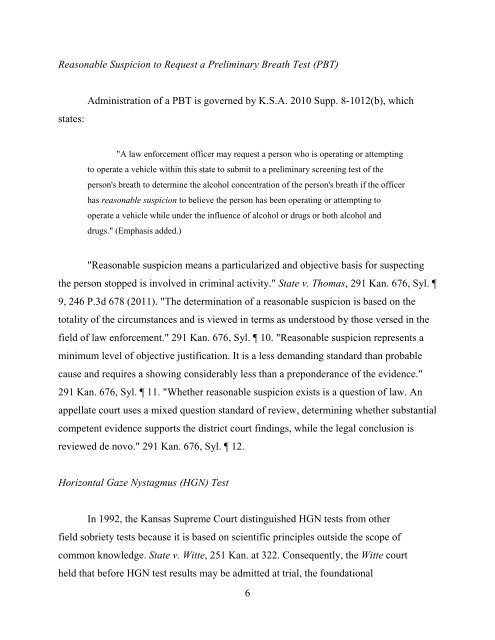Kansas Court of Appeals - 104940 â City of Wichita v. Molitor
Kansas Court of Appeals - 104940 â City of Wichita v. Molitor
Kansas Court of Appeals - 104940 â City of Wichita v. Molitor
Create successful ePaper yourself
Turn your PDF publications into a flip-book with our unique Google optimized e-Paper software.
Reasonable Suspicion to Request a Preliminary Breath Test (PBT)<br />
states:<br />
Administration <strong>of</strong> a PBT is governed by K.S.A. 2010 Supp. 8-1012(b), which<br />
"A law enforcement <strong>of</strong>ficer may request a person who is operating or attempting<br />
to operate a vehicle within this state to submit to a preliminary screening test <strong>of</strong> the<br />
person's breath to determine the alcohol concentration <strong>of</strong> the person's breath if the <strong>of</strong>ficer<br />
has reasonable suspicion to believe the person has been operating or attempting to<br />
operate a vehicle while under the influence <strong>of</strong> alcohol or drugs or both alcohol and<br />
drugs." (Emphasis added.)<br />
"Reasonable suspicion means a particularized and objective basis for suspecting<br />
the person stopped is involved in criminal activity." State v. Thomas, 291 Kan. 676, Syl. <br />
9, 246 P.3d 678 (2011). "The determination <strong>of</strong> a reasonable suspicion is based on the<br />
totality <strong>of</strong> the circumstances and is viewed in terms as understood by those versed in the<br />
field <strong>of</strong> law enforcement." 291 Kan. 676, Syl. 10. "Reasonable suspicion represents a<br />
minimum level <strong>of</strong> objective justification. It is a less demanding standard than probable<br />
cause and requires a showing considerably less than a preponderance <strong>of</strong> the evidence."<br />
291 Kan. 676, Syl. 11. "Whether reasonable suspicion exists is a question <strong>of</strong> law. An<br />
appellate court uses a mixed question standard <strong>of</strong> review, determining whether substantial<br />
competent evidence supports the district court findings, while the legal conclusion is<br />
reviewed de novo." 291 Kan. 676, Syl. 12.<br />
Horizontal Gaze Nystagmus (HGN) Test<br />
In 1992, the <strong>Kansas</strong> Supreme <strong>Court</strong> distinguished HGN tests from other<br />
field sobriety tests because it is based on scientific principles outside the scope <strong>of</strong><br />
common knowledge. State v. Witte, 251 Kan. at 322. Consequently, the Witte court<br />
held that before HGN test results may be admitted at trial, the foundational<br />
6

















